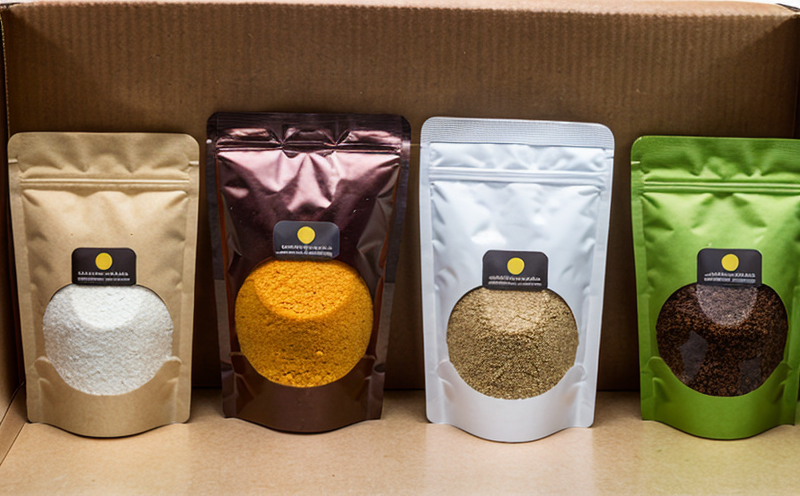Cleaning Chemical Resistance Testing in Food Contact Materials
Cleaning chemical resistance testing is an essential aspect of ensuring that materials used in food contact applications are safe and do not leach harmful substances into the food. This service evaluates how well a material resists degradation by cleaning agents, which can vary widely in composition and strength. The purpose is to ensure compliance with regulatory standards and consumer safety.
The testing process involves subjecting the material to various cleaning chemicals under controlled conditions that mimic real-world scenarios. This includes exposure to acidic, alkaline, and neutral solutions at different temperatures and for varying durations. The specimens are then analyzed for changes in physical properties such as hardness, flexibility, color, and chemical composition.
The regulatory landscape is stringent when it comes to food contact materials due to the potential health risks associated with contamination or leaching of undesirable substances into food products. Compliance with standards like ISO 10391-2 ensures that testing protocols are robust and internationally recognized.
One common scenario involves simulating a dishwasher wash cycle, where the material is exposed to hot water along with detergent. Another might involve soaking in an acidic solution used for fruit or vegetable washing. These tests help identify whether the material can withstand such harsh conditions without compromising its integrity or releasing harmful chemicals.
Specimen preparation plays a crucial role in achieving accurate results. Materials are cut into standard sizes, cleaned, and conditioned before testing. This ensures that all specimens undergo identical initial conditions, providing more reliable data for comparison purposes.
Instrumentation used during these tests includes advanced analytical tools such as Fourier Transform Infrared Spectroscopy (FTIR), Gas Chromatography-Mass Spectrometry (GC-MS), and Inductively Coupled Plasma Mass Spectrometry (ICP-MS). These instruments allow for precise measurement of chemical changes in the material after exposure to cleaning agents.
The results from these tests are critical not only for compliance but also for quality assurance. They provide insights into the longevity and reliability of food contact materials under everyday usage conditions. By understanding how a material behaves over time, manufacturers can make informed decisions about product design and formulation improvements.
Compliance with relevant standards is paramount in this field. For instance, ISO 10391-2 provides guidelines for determining the resistance of plastics to detergents, while ASTM D4706 offers similar information specifically for polymeric materials used in food-contact applications.
Real-world implications are significant; consumers trust that their kitchenware and packaging will not contaminate food with harmful substances. This trust is built on rigorous testing practices that ensure safety standards are met.
Benefits
- Enhanced Consumer Safety: Ensures that materials do not leach harmful chemicals into food, thereby protecting public health.
- Regulatory Compliance: Helps companies meet stringent international and regional regulations related to food safety.
- Product Integrity: Provides evidence of material durability under real-world conditions, enhancing product reliability.
- Market Confidence: Builds trust among consumers by demonstrating a commitment to high-quality, safe products.
International Acceptance and Recognition
Cleaning chemical resistance testing is widely accepted across various international standards. Here are some key organizations that recognize this type of testing:
- ISO (International Organization for Standardization): ISO 10391-2 and ISO 6581.
- ASTM International: ASTM D4706, which specifically addresses the resistance of polymeric materials to detergents.
- EN (European Standard): EN 13912, which sets out requirements for plastic materials used in food-contact applications.
- IEC: IEC 60601-1, which includes sections on cleaning and disinfection of medical devices, although it also applies to certain types of food contact materials.
Competitive Advantage and Market Impact
Implementing thorough cleaning chemical resistance testing can provide a significant competitive edge in the marketplace. Compliance with international standards not only meets regulatory requirements but also differentiates products by demonstrating superior quality assurance practices.
Companies that invest in robust testing programs are better positioned to navigate evolving regulations and consumer expectations. They can anticipate potential issues before they become public, thereby reducing recalls and associated costs. Moreover, such investments enhance brand reputation, fostering long-term customer loyalty and trust.
The ability to offer products that have been rigorously tested enhances market presence and attracts discerning consumers who prioritize safety and quality. This competitive advantage can translate into higher sales volumes and increased market share.





